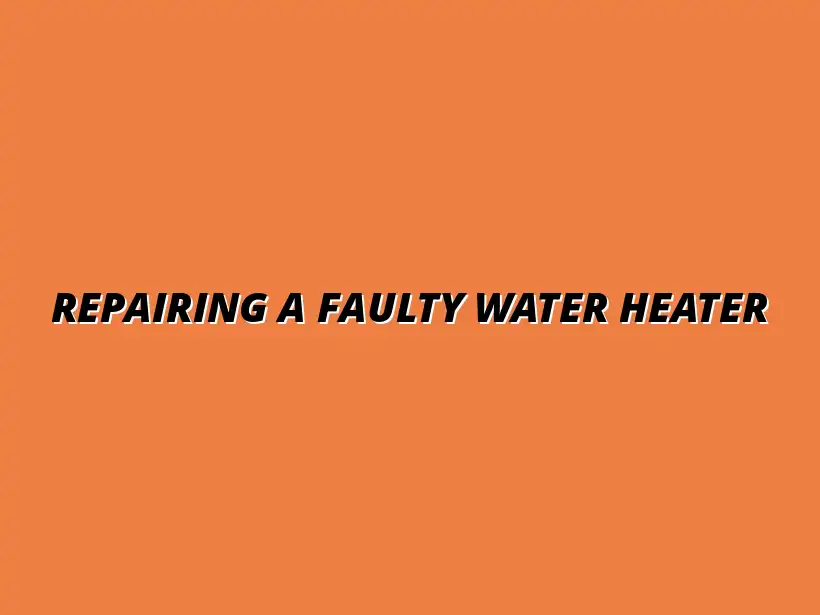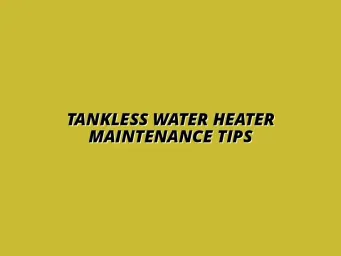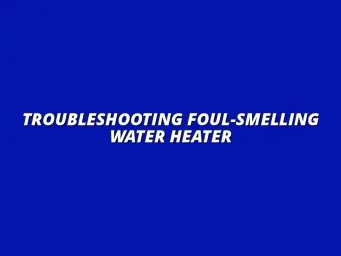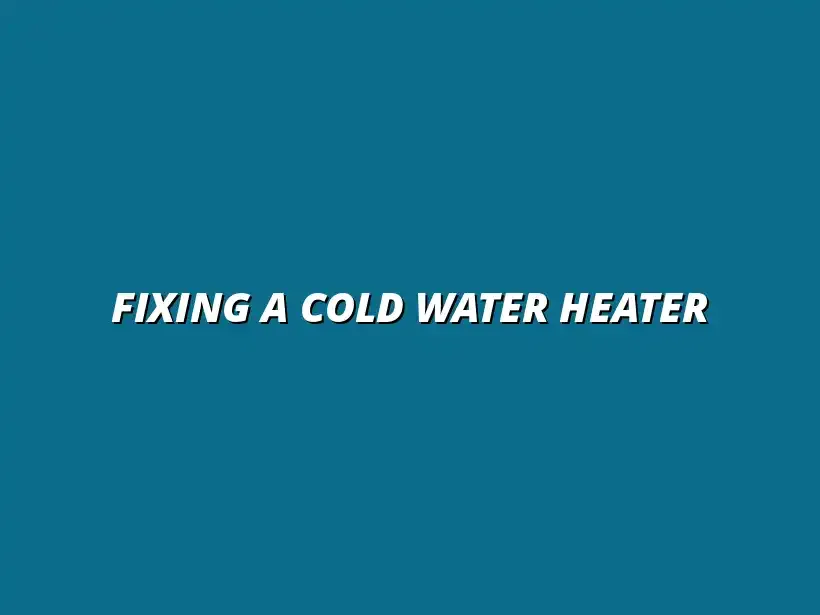
Repairing a Faulty Water Heater
Understanding Electric Water Heaters and Their Components
Electric water heaters are essential appliances that provide hot water for various household needs. They operate by using electric elements to heat water stored in a tank. These heaters come in different sizes and capacities, making them suitable for homes of all sizes, ensuring you always have hot water on demand!
One of the key benefits of electric water heaters is their efficiency. They can heat water quickly and maintain it at a consistent temperature. This ensures that you're not left waiting for hot water when you need it most, whether it's for a shower, doing laundry, or washing dishes. Regular maintenance, such as flushing your water heater, is key to maintaining efficiency. Learn how to flush your water heater easily and extend its lifespan.
An Overview of Electric Water Heaters
Electric water heaters typically consist of several important components, including a tank, heating elements, thermostat, and various safety features. The tank holds the heated water, while the heating elements are responsible for warming the water to the desired temperature. The thermostat controls the temperature, ensuring that the water stays warm without overheating.
Electric water heaters are often preferred due to their ease of installation and lower initial costs compared to gas models. They are also generally safer since they do not produce combustion gases, reducing the risk of carbon monoxide poisoning. However, they may require a higher electricity demand, which can be a consideration based on your energy bills. If you're experiencing issues with your water heater's power supply, you may need to repair a powerless electric water heater.
How Electric Water Heaters Function and Their Benefits
When you turn on the hot water tap, cold water enters the tank, and the heating elements activate to warm it. This process continues until the set temperature is reached, at which point the thermostat regulates the power supply to maintain it. One major benefit of this system is the ability to set specific temperatures for different uses, enhancing both safety and efficiency.
Additionally, electric water heaters can be equipped with insulation to minimize heat loss, making them more energy-efficient. This insulation helps retain heat, ensuring that energy consumption is kept to a minimum, which is great for both your wallet and the environment! To learn more about extending the life of your electric water heater, check out these helpful maintenance tips.
Common Issues Faced with Electric Water Heaters
Like any appliance, electric water heaters can encounter problems. Some common issues include inadequate heating, leaks, and strange noises coming from the unit. These problems can often be traced back to the heating elements or the thermostat, making it important to address them promptly to avoid further damage. Replacing your water heater thermostat might be necessary; here's a guide on how to replace your water heater thermostat.
- Inconsistent water temperature
- Water leaks around the tank
- Strange noises like popping or humming
- High energy bills due to inefficiency
Recognizing these issues early can save you time and money. Regular maintenance and inspections can help keep your electric water heater running smoothly for years to come!
Common Questions and Troubleshooting Tips
If you own an electric water heater, you may have some questions about its upkeep and potential issues. Understanding these common queries can make your life easier and help you maintain your unit effectively. Here, I’ll cover frequently asked questions and provide some troubleshooting tips that can save you time and money!
FAQs Related to Electric Water Heater Repairs
Let’s dive into some of the most common questions regarding electric water heater repairs. These FAQs not only address typical concerns but also provide insights into maintaining your system effectively. Remember, being informed is the first step toward keeping your water heater in top shape. For professional help in Birmingham, consider contacting a plumber in Billesley, Birmingham.
What Other Issues Can Affect Electric Water Heaters?
Electric water heaters can face various issues apart from heating element failures. Some common problems include:
- Temperature Issues: Water may be too hot or not hot enough.
- Water Leaks: Leaks can occur from the tank or connections.
- Noisy Operation: Banging or popping sounds can indicate sediment buildup.
- Power Supply Problems: Issues with electricity can prevent the heater from functioning.
Being aware of these problems can help you troubleshoot early, ensuring your water heater operates smoothly. Regular checks can prevent major problems; find out more about regular bathroom water heater checks.
How to Extend the Life of Your Electric Water Heater
To maximize the lifespan of your electric water heater, regular maintenance is essential. Here are some effective tips:
- Flush the tank annually to remove sediment buildup.
- Check the anode rod every few years and replace it if necessary.
- Insulate the tank and pipes to improve efficiency.
- Set the thermostat to 120°F for optimal performance.
Implementing these practices can lead to a longer lifespan and better efficiency for your unit!
Final Thoughts on Electric Water Heater Maintenance
Maintaining your electric water heater is crucial for its longevity and performance. While some repairs can be tackled independently, knowing when to seek professional help is vital. If you’re experiencing persistent issues, consider consulting with a technician. Ignoring drainage issues can lead to bigger problems; learn about effective drainage solutions for flood risks to prevent water damage.
When to Seek Professional Help for Electric Water Heater Problems
Sometimes, despite our best efforts, it’s better to involve an expert. Recognizing the right moment to call for help can save you from further damage and costly repairs. Let’s explore the signs that indicate it’s time to bring in a professional.
Signs Indicating It's Time to Call an Expert
Keep an eye out for these warning signs that suggest it might be time to reach out to a technician:
- Frequent Repairs: If you’re constantly fixing the same problem.
- Water Discoloration: Rusty or discolored water can indicate serious issues.
- Unusual Noises: Persistent banging or whistling sounds can hint at trouble.
- Leakage: If you notice substantial leaks that you cannot fix.
Addressing these problems quickly with a professional can prevent more severe issues down the line!
Choosing the Right Technician for Electric Water Heater Repairs
When it’s time to hire a technician, it’s essential to select someone who is qualified and trustworthy. Look for the following attributes:
- Licensing and insurance to ensure you’re protected.
- Good reviews or recommendations from previous clients.
- Experience specifically with electric water heaters.
- Transparent pricing with no hidden fees.
Taking the time to choose the right technician can lead to a smoother repair process and peace of mind!
Summary of Effective Electric Water Heater Repair Strategies
In conclusion, understanding the ins and outs of electric water heater repairs equips you for proper maintenance. From recognizing issues to knowing when to call a professional, staying informed is key. Let’s recap the crucial steps for effective repairs.
Recap of Key Steps for Repairing the Heating Element
Here are the essential steps to remember when dealing with a faulty heating element:
- Identify symptoms of malfunction.
- Drain the water heater carefully.
- Remove the faulty heating element.
- Install the new heating element properly.
- Reassemble and test the water heater.
Following these steps can help ensure a successful repair!
Importance of Regular Maintenance for Optimal Performance
Finally, don’t underestimate the importance of regular maintenance. Keeping your electric water heater in good condition not only enhances efficiency but also saves you from future headaches. Remember, a little care goes a long way!




